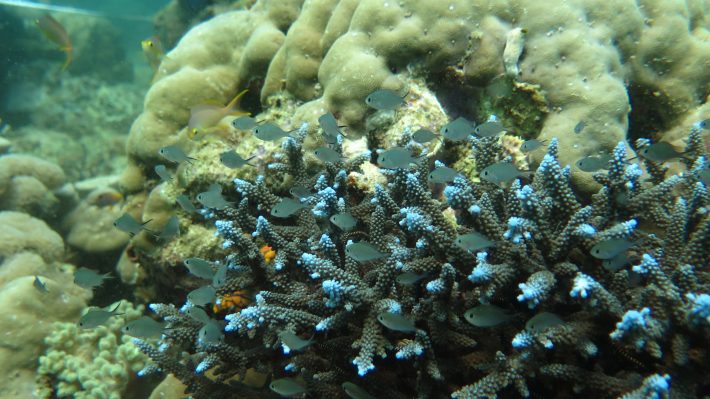Degrading coral reefs bad news for commercial fishing
University of Queensland press release
The degradation of coral reef fisheries might have short-term benefits for some species, but would be bad for fisheries in the long term, a new University of Queensland-led study published in Journal of Applied Ecology reveals.

The study, which focuses on fisheries’ productivity under progressive coral reef degradation, has also found that fisheries may be fairly robust up until the initial reef degradation stages.
However, authorities needed to change management practices to take advantage of those benefits, UQ postdoctoral research fellow Dr Alice Rogers said.
Dr Rogers, of UQ’s Marine Spatial Ecology Lab in the School of Biological Sciences, said coral reef health around the world was deteriorating, affecting the lives of tens of millions of people.
“The loss of living corals alters the flora and fauna found in the sea,” she said.
“This means less refuges and places to hide for reef fish – but it also means more algae, and more invertebrates that many reef fish eat.
“Our study used a size-based food web model of a coral reef to explore how these changes affect coral reef communities, food webs and the potential productivity of coral reef fisheries.
“We found that initial losses of living coral, but not erosion of their structure, increased fisheries productivity in the short term, but productivity increases were from herbivorous fish and smaller fish that may not be the most highly valued fisheries targets.
“When the structure of the reef eroded following coral death, all the benefits were lost.”
Dr Rogers undertook the study with UQ’s Professor Peter Mumby of the ARC Centre of Excellence in Coral Reef Studies, and Dr Julia Blanchard of the University of Tasmania. She joins Victoria University, Wellington next year.
Read the full article (freely available for a limited time):
Rogers A, Blanchard JL, Mumby PJ, Arlinghaus R. Fisheries productivity under progressive coral reef degradation. J Appl Ecol. 2017;00:1–9. DOI: 10.1111/1365-2664.13051
Media contact:
Dr Alice Rogers (a.rogers2@uq.edu.au) or Professor Peter Mumby (p.j.mumby@uq.edu.au) from the University of Queensland
Like what we stand for?
Support our mission and help develop the next generation of ecologists by donating to the British Ecological Society.